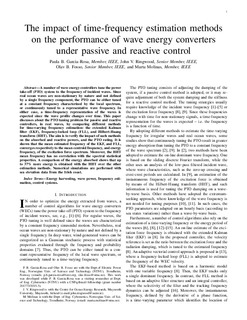| dc.contributor.author | Garcia Rosa, Paula Bastos | |
| dc.contributor.author | Ringwood, John V. | |
| dc.contributor.author | Fosso, Olav B | |
| dc.contributor.author | Molinas Cabrera, Maria Marta | |
| dc.date.accessioned | 2019-03-01T11:38:22Z | |
| dc.date.available | 2019-03-01T11:38:22Z | |
| dc.date.created | 2018-09-23T10:50:10Z | |
| dc.date.issued | 2018 | |
| dc.identifier.issn | 1949-3029 | |
| dc.identifier.uri | http://hdl.handle.net/11250/2588238 | |
| dc.description.abstract | A number of wave energy controllers tune the power take-off (PTO) system to the frequency of incident waves. Since real ocean waves are non-stationary by nature and not defined by a single frequency component, the PTO can be either tuned at a constant frequency characterized by the local spectrum, or continuously tuned to a representative wave frequency. In either case, a time-frequency representation of the waves is expected since the wave profile changes over time. This paper discusses about the PTO tuning problem for passive and reactive controllers, in real waves, by comparing different methods for time-varying frequency estimation: the extended Kalman filter (EKF), frequency-locked loop (FLL), and Hilbert-Huang transform (HHT). The aim is to verify the impact of such methods on the absorbed and reactive powers, and the PTO rating. It is shown that the mean estimated frequency of the EKF, and FLL, converges respectively to the mean centroid frequency, and energy frequency, of the excitation force spectrum. Moreover, the HHT mean frequency has no correlation with the spectral statistical properties. A comparison of the energy absorbed shows that up to 37% more energy is obtained with the HHT over the other estimation methods. Numerical simulations are performed with sea elevation data from the Irish coast. | nb_NO |
| dc.language.iso | eng | nb_NO |
| dc.publisher | Institute of Electrical and Electronics Engineers (IEEE) | nb_NO |
| dc.relation.uri | https://www.researchgate.net/publication/327739537_The_impact_of_time-frequency_estimation_methods_on_the_performance_of_wave_energy_converters_under_passive_and_reactive_control | |
| dc.subject | Non Stationary signal analysis | nb_NO |
| dc.subject | Hilbert Huang Transform HHT | nb_NO |
| dc.title | The impact of time-frequency estimation methods on the performance of wave energy converters under passive and reactive control | nb_NO |
| dc.type | Journal article | nb_NO |
| dc.type | Peer reviewed | nb_NO |
| dc.description.version | acceptedVersion | nb_NO |
| dc.subject.nsi | VDP::Elkraft: 542 | nb_NO |
| dc.subject.nsi | VDP::Electrical power engineering: 542 | nb_NO |
| dc.source.journal | IEEE Transactions on Sustainable Energy | nb_NO |
| dc.identifier.doi | 10.1109/TSTE.2018.2870966 | |
| dc.identifier.cristin | 1612488 | |
| dc.description.localcode | © 2018 IEEE. Personal use of this material is permitted. Permission from IEEE must be obtained for all other uses, in any current or future media, including reprinting/republishing this material for advertising or promotional purposes, creating new collective works, for resale or redistribution to servers or lists, or reuse of any copyrighted component of this work in other works. | nb_NO |
| cristin.unitcode | 194,63,20,0 | |
| cristin.unitcode | 194,63,25,0 | |
| cristin.unitname | Institutt for elkraftteknikk | |
| cristin.unitname | Institutt for teknisk kybernetikk | |
| cristin.ispublished | true | |
| cristin.fulltext | preprint | |
| cristin.qualitycode | 1 | |
